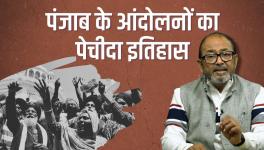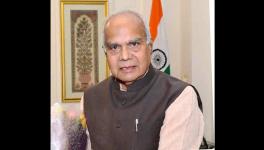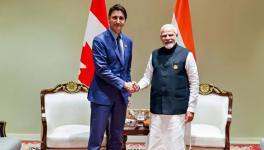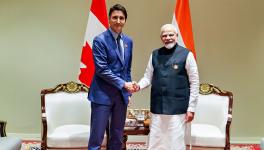Why Punjab Will Not be a Cakewalk for Congress Party
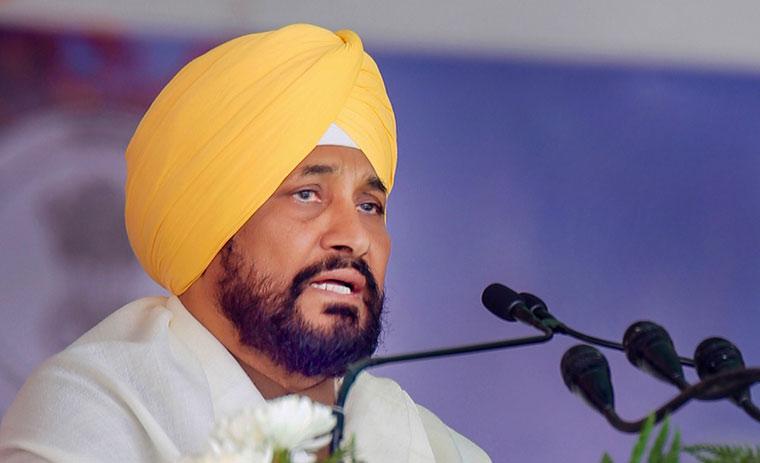
Charanjit Singh Channi. Image Courtesy: PTI
In Punjab, the peasant movement has put all political parties, including the BJP, in the dock. However, the thirst for power and tussle within political parties is still the name of the game. On 18 September, Captain Amarinder Singh resigned as chief minister after a prolonged dispute with Navjot Singh Sidhu, the newly-installed state party chief. After quitting, he expressed displeasure towards the Congress high command and made serious allegations against Sidhu. He said feeling “humiliated” spurred his resignation, which Congress president Sonia Gandhi knew of, and that he is still a Congressman, but was open to political choices.
Amarinder Singh launched a scathing attack on Sidhu, saying he may be a good cricketer but as chief minister he would be a “threat to national security”. He also said Sidhu has friendly relations with Pakistan Prime Minister Imran Khan, Pakistan Army Chief Qamar Javed Bajwa, and weapons from Pakistan are finding their way into Punjab. He called Sidhu an “anti-national element” unfit to be chief minister of Punjab. On the next day, after a lengthy discussion, the Congress high command picked Charanjit Singh Channi as the new chief minister of Punjab. He is the first Dalit chief minister of Punjab. In 1972, former President Giani Zail Singh, who became the ninth chief minister of the state, was from the Ramgarhia brotherhood of backward classes.
This is the fifth resignation of Captain Amarinder Singh’s political career. His first resignation was in 1984, in protest against the military attack on the Darbar Sahib. At the time, he was the Congress MLA from Patiala. In 1986, he resigned as minister in Surjit Singh Barnala’s government in protest against “Operation Black Thunder”. In 2014, he resigned from the Patiala Urban Legislative Assembly seat when he got elected to the Lok Sabha from Amritsar. After he got re-elected to the Assembly in 2017, he resigned from the Lok Sabha.
The political journey of Captain Amarinder Singh has been fascinating. In 1963, he got recruited as an army officer but resigned in 1965. He rejoined the army after war broke out between India and Pakistan, and resigned again after the war. His school friend, Rajiv Gandhi, brought him into politics and he was elected a Lok Sabha member in 1980. In 1984, he left the Congress party and joined the Akali Dal. In 1985, after winning the Assembly election, Singh became a minister in the Barnala cabinet. In 1992, he broke from the Akali Dal and formed his party, Akali Dal (Panthak). Later, he returned to the Akali Dal, but when he did not get a ticket to contest the Assembly election in 1997, he left and, in 1998, joined the Congress party. Very soon, he got elected the president of the Punjab Pradesh Congress Committee. Here, his sharp differences with the old leaders of Congress resumed. When the Congress party won the 2002 Assembly election, Amarinder Singh became the chief minister of Punjab. He had differences with the then deputy chief minister, Rajinder Kaur Bhattal. During this period, he ran an anti-corruption campaign that exposed the previous Akali government. He also took commendable decisions in favour of farmers, spoke out for farmers on water-related disputes and cancelled all old water-sharing agreements via a resolution passed in the Assembly. Amarinder Singh emerged as an influential leader in Punjab due to these measures. He became a notable figure even in the state’s rural and panthic circles. The urban population was also with him. Yet even in those days, he was accused of rarely seeing his MLAs and generally remaining absent. There was talk about his friendship with Arusa Alam, a Pakistani. News of the “city center scam” broke during his tenure.
Fact is, Amarinder Singh questions Sidhu’s ties with Pakistan and calls him “anti-national” today, but there are many questions he may be unable to answer himself. Amarinder was one of the signatories of the 1994 “Amritsar Declaration” that spoke of the right to self-determination for the Sikhs. He was one of the founders of the Akali Dal (Amritsar) in 1994, a party known to support Khalistani ideology. When he visited Canada during his first term, he was accused of sharing the stage with people who leaned towards Khalistani ideology. Khalistani banners were placed behind the stage of the Gurudwara in Toronto during his address. At the time, this issue sparked heated debates in Punjab. Amarinder Singh also got the support of “garam” or radical Sikh factions from 2002 to 2007. According to Indian-origin Canadian journalist Gurpreet Singh, “Captain Amarinder Singh’s politics has been based on opportunism, so he sometimes mixes with ‘radical’ Sikh factions, sometimes adopts a soft stance towards hardline Hindu organisations, and at other times becomes cozy with so-called nationalists.”
The same Amarinder Singh who accuses Sidhu of dallying with Pakistan spent his first term enhancing the friendship between the two Punjabs. During his tenure, the then Chief Minister of Pakistani Punjab, Chaudhry Parvez Elahi, visited Indian Punjab to attend the “World Punjabi Conference”. The Shiromani Punjabi Award of the Punjab government went to the chief ministers of both Punjabs that year. At the same conference, Amarinder Singh and Elahi laid the foundation stone of the World Punjabi Center at Punjabi University, Patiala. The state government erected giant posters of Captain Amarinder and Pervez Elahi across the cities of Punjab to mark the event. The people of both Punjabs had welcomed the friendly ties between Indian and Pakistani Punjab wholeheartedly. Punjabi literature lover Harish Modgil expresses surprise over Amarinder’s recent remarks and says, “It is sad the captain has spoken about Sidhu in these terms. Both Punjabs want friendship with each other and we Punjabis want good relations between the leaders of both countries, so that people can live in peace and love. When the Captain talked about a fresh dawn in both Punjabs, people welcomed him. It is baseless to label someone as ‘anti-national’ just on the basis of being friends with Pakistani leaders. The culture of Punjab does not accept it.”
In 2007, the Congress party lost the Assembly election and the Akali-BJP coalition came to power, where it remained for ten years. The Akali Dal committed many irregularities during its rule. Drug smuggling, illegal mining, gangsterism, hooliganism of local Akali leaders, capture of the transport economy by members of the Badal family, sacrilege of Guru Granth Sahib and the Bargadi firing incident, occurred, continued or burgeoned under its watch. On the other hand, Amarinder had to confront challenges from within his party both locally and from the high command. Unlike Sonia Gandhi, Rahul Gandhi did not like Amarinder Singh’s leadership. In the 2014 Lok Sabha election, Amarinder was pitted against Arun Jaitley of the BJP from the Amritsar constituency as a kind of test. Captain won the election. Thereafter, his estrangement with Pratap Singh Bajwa, who was made the Congress state head against his wishes, grew more bitter. The saga reached the point where everyone felt the Captain would break away from the Congress to form a new party. But in the end, the Congress contested the 2017 Assembly election under Amarinder and got 77 seats—more than anybody expected.
Amarinder Singh then took an oath at the holy Gutka Sahib and promised the people of Punjab he would punish those who had blasphemed against the Guru Granth Sahib. He said he would have the Bargadi incident and alleged irregularities of the Badal period investigated, besides assuring the youth new jobs. But he could not fulfil these promises. The chief minister, who was considered impudent during his first innings, started appearing weak and unfaithful in his second. His soft stance towards the Badal family cost him especially dear. Sidhu, who joined the Congress from the BJP, constantly corralled him on his relations with the Badal clan, even claiming that the Congress may have won all 13 seats in Punjab in the 2019 Lok Sabha election, were not the chief minister inclined favourably towards the Badals.
Now, with little time before the 2022 Assembly election, the captain’s ministers were beginning to fear facing the people with their dismal record. Political experts say the captain was distant from people during this innings and did not meet the party’s MLAs and ministers. Amarinder Singh’s excessive dependence on the bureaucracy and giving them virtually unchecked power is also considered his big mistake. Elected representatives felt insulted by how open his doors were to the state chief secretary, for instance. His relations with the Congress high command also turned sour when he did not act on its “18-Point Agenda” for the state. Amarinder Singh kept his silence on power agreements, while all kinds of mafia operatives seemed to have the sanction of his regime, and there was no relief from the drugs scourge. Although he took some farmer-oriented decisions, his statement a few days ago that the farmers’ movement should not exist within the state but outside it invited strong criticism from farm leaders. The nature of his ties with the BJP government at the Center was also a subject of speculation and doubt. He never openly and firmly criticised the BJP, some experts felt. Others believe he was probably afraid the Center would unleash central investigative agencies on him if he seemed too critical.
According to political analyst Pyare Lal Garg, “Captain’s policy was to bow before the BJP. It was clear from his meetings with the Prime Minister and Home Minister in the past that he was trying to push Punjab towards President’s rule. He deliberately made chauvinistic remarks pertaining to Pakistan [in Sidhu’s context]. Is all this to implement the BJP’s agenda? He did not make any concerted effort to get Punjab out of trouble, even financially.” Commenting on the current situation and political equations within the Punjab Congress, eminent thinker Prof. Bawa Singh says, “Political parties may engage in all kinds of hypocrisy, but it is the farmers’ movement that will give direction to the current politics of Punjab. People have rejected almost all parties.”
According to Bawa, the current moment may well mark Captain Amarinder Singh’s political demise, and so he does not think he will go to the BJP under any circumstances. “His other option may be to form a new party, in which it is difficult to see him succeed. Navjot Singh Sidhu is taken as non-serious, but his image is of an honest leader. With the Kartarpur Corridor, Sidhu created a special space for himself in the Sikh brotherhood and among Punjabis. Sidhu has scored some points for the progress of Punjab, but it has to be seen how serious he is in coming times. To do serious politics, he will have to give up his irresponsible behaviour,” says Bawa.
Charanjit Singh Channi may be the new Punjab Chief Minister, with the seal of approval from the Congress high command, but the rest of its journey in the state will be difficult. Dealing with internal divisions will still challenge the Congress party throughout.
The author is an independent journalist. The views are personal.
Get the latest reports & analysis with people's perspective on Protests, movements & deep analytical videos, discussions of the current affairs in your Telegram app. Subscribe to NewsClick's Telegram channel & get Real-Time updates on stories, as they get published on our website.










